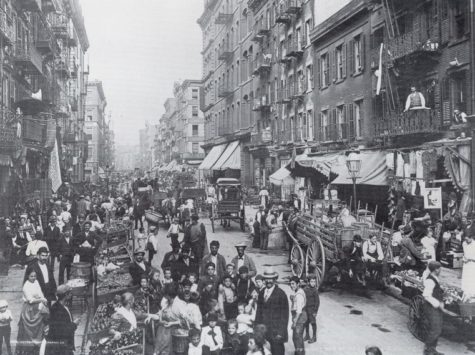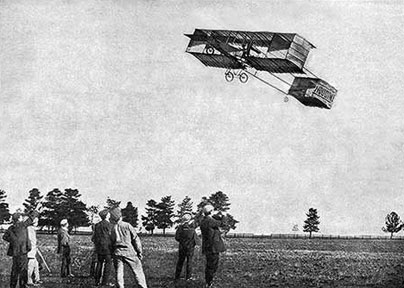In 1910, Harry Houdini, the world's biggest live act, came to Melbourne. He performed magic, flew a plane, and jumped into the Yarra River.

Harry Houdini was born Ehrich Weisz, in Budapest, Hungary, in 1874.
His father was a Rabbi, and the family was large; Houdini was one of 7 children. They were also poor, and Houdini’s father was eager to move to America, hoping to improve the family’s fortunes. He was able to secure a position as the head of a Jewish synagogue in Wisconsin, and the family moved to the US when Houdini was 4.
But things did not go as planned.
In 1882, Houdini’s father lost his job and the family fell into poverty. They were forced to move several times, before arriving in New York in 1887, where they settled in a rooming house on the Upper East Side.
To help make ends meet, Houdini dropped out of school and worked odd jobs. One of these was as a street performer, working as an assistant in a trapeze act.
Houdini enjoyed it so much he began to explore ideas for his own act.
In 1890, he read the autobiography of Jean-Eugene Robert-Houdin, a famed French magician who helped modernise the craft of stage magic. Entranced with the book, Houdini set himself to become a magician.
In honour of his hero, he adopted a variant as his stage name: ‘Harry Houdini’.

Houdini studied magic under Joseph Rinn, an amateur at his local youth club.
While enthusiastic, Houdini was only a competent magician. He was slow, a little clumsy, and struggled to master the basic tricks. Nevertheless, he began performing at fares, at circus’, and on the boardwalk at Coney Island, where he appeared with his brother Dash.
While at Coney Island he also met Bess Rainer, a dancer and stage performer. The pair started dating, and were married in 1894.
Rainer subsequently replaced Dash as Houdini’s stage assistant.

While only a mediocre magician, Houdini was athletic and strong, traits he realised he could utilise in a different type of act: escape artist.
He started simply, escaping from a pair of police handcuffs. Soon he would have his legs and arms wrapped in chains, or his whole torso. Sometimes he was locked in a safe, and escaped while it was hidden behind a curtain.
These new tricks proved enormously popular, and Houdini took his act on the road. He toured America in 1899, and Europe in 1900 and 1902, with great success.

As his fame increased, Houdini added more dangerous stunts. He left the theatre and often performed outside, in front of a live audience, in a less controlled environment.
Touring relentlessly, from 1905 he began escaping from the vault of a bank in the city he was performing in. Even more dangerously, he allowed himself to be shackled and thrown into the town river, or to be suspended above the main street by his ankles, secured in a straitjacket.
Each time he managed to free himself, usually within a few minutes.
Rumours began to circulate that Houdini had mystic powers, the ability to dematerialise, that he had second sight and communicated with the spirit world. Houdini and his team encouraged these tales, allowing his legend to grow.
In reality, he used skeleton keys and lock picks, hidden on his person. Sometimes he simply used his natural strength and agility to wriggle free. All of his exploits were exhaustively covered by the press, who hyped every new trick and tour.
At the height of his fame, in 1910, Houdini brought his act to Australia.

Harry Rickards was a former actor who had made a fortune in the Melbourne theatre business.
At the dawn of the 20th century, Melbourne was a city enamoured with live entertainment. Many grand venues adorned the inner city streets, showcasing a wide variety of acts. Everything from opera and theatre, to dance, comedy, vaudeville, circus acts and magic.
Competition for the newest and most exciting performers was fierce.
Rickards owned one of the city’s most notable theatres, the ‘New Opera House’ on Bourke Street (sadly long gone, the ‘Tivoli Arcade’ stands on the spot today). As a promoter he was always interested in innovation. He brought the first movie reels to Australia, and was behind the first public cinema screening (you can read about this, here).
In 1910, Rickards was able to secure Houdini for a series of dates.

Houdini’s first appearance at the New Opera House was on February 7, 1910.
The program was in two halves. The first consisted of appearances by some of the theatre’s stock players, regulars who were kept on staff and who appeared each week. For Houdini’s first night there was a comedian, a singer, and a family dance troupe.
After an interval, Houdini took the stage. His entrance was dramatic.
He was introduced by a series of short films, showing previous escape tricks from earlier tours. The house was full; 1 400 patrons waiting for the master magician to appear.

After the films concluded, Houdini took the stage; a short, striking man, wearing evening dress.
Members of the audience were invited to join him, to bind Houdini’s hands with rope, behind his back. He then disappeared behind a curtain, emerging moments later with his hands freed, to wild applause.
His next trick, known as ‘Metamorphosis’, went one better.
Audience members again bound Houdini’s hands behind his back. He was then placed inside a large sack, which was tied shut, and placed in a trunk, which was nailed closed. Properly secured, the trunk was wheeled by Houdini’s wife Bess into a large cabinet which was sealed, with them both inside.
Only a few seconds later, the cabinet was reopened, and Houdini was now outside of the trunk. The trunk was still secured as before, and when it, and the sack inside, were opened… Houdini’s wife was inside! As the final showstopper, she was even wearing Houdini’s coat.
The audience was in hysterics.

Houdini ran through a few more tricks, finishing with an escape from a straitjacket.
He concluded the performance with a dramatic announcement: within the coming days, as soon as he had obtained the proper permission, he would be shackled and jump from the Queens Bridge, into the Yarra River. He would either escape… or drown!
This daring feat was scheduled for Thursday, February 17, at 1.30pm.

February 17 was a hot day, the temperature hovering around 38 degrees.
From lunchtime, a large crowd began gathering on the bridge, and on either bank of the Yarra. Some spectators even hired boats, and rowed out into the waterway. It was mixed audience; working men in overalls, alongside linen suits, straw boaters and ladies in veils.
By 1.30, about 20 000 spectators were waiting.
Houdini arrived shortly after, by motorcar. He was dressed in a neck to knee blue bathing suit, and waved happily to the crowd.

Houdini was handcuffed, and then additional chains were wrapped around his upper body. Members of the crowd tested the bonds and pronounced them secure. The chains were then weighted, to ensure he would sink to the bottom of the river.
Houdini took a deep breath, and jumped.
The Yarra is a dark brown colour, so once Houdini broke the water, he disappeared from view. The crowd waited anxiously.
Minutes passed.
Some of the police attending the event launched into the river in a small punt, in case rescue was required.

After about 4 minutes, accounts vary, Houdini broke the surface of the river, smiling in triumph. His chains were in his hand.
On the river bank, he saluted the excited crowd briefly, before he was whisked back to the New Opera House, to prepare for that evening’s show. Later, he would tell reporters that the escape was just a trick, and that he had never been in any real danger.
But his performance made Houdini the toast of Melbourne. And he wasn’t quite finished.

In addition to his other interests, Houdini was also an enthusiastic aviator.
In 1910, this was a brand new field. The first manned flight, performed by the Wright Brothers in North Carolina, had taken place only seven years before. No one had yet flown a plane, in Australia.
The previous year, Houdini had purchased a French built Voison bi-plane, which he had learned to fly in Europe. Its construction was light, it was made out of timber and linen, and he decided to bring it with him on tour.
A month after his jump into the Yarra, Houdini took his plane to Digger’s Rest, a small town about 30km north of Melbourne.

Unsuccessful flight attempts were made on March 17.
The following day, Houdini was able to get his plane aloft. He recorded a flight time of 2 minutes and thirty seconds, with a maximum height estimated at about 100 metres.
Houdini stayed in Digger’s Rest for a few days, and flew successfully several more times. At the time, the press reported it was the first successful manned flight ever achieved in Australia, and further plaudits were heaped on the visiting magician.
Decades later, historians would unearth a claim disputing Houdini’s hold to this record.
Fred Jones, a South Australian farmer, claimed in 1943 he had witnessed his neighbour, Fred Custance, fly an imported American monoplane the day before Houdini, on March 17. As Fred Jones is the only witness to this event, the claim remains disputed.

The remainder of Houdini’s shows in Melbourne were sold out, the tour overall a wild success. Houdini then moved on to other cities, and flew again in Sydney and Brisbane.
At the end of his Australian tour, Houdini sold the plane. He reportedly never flew again.


One thought on “When Houdini Came to Melbourne”